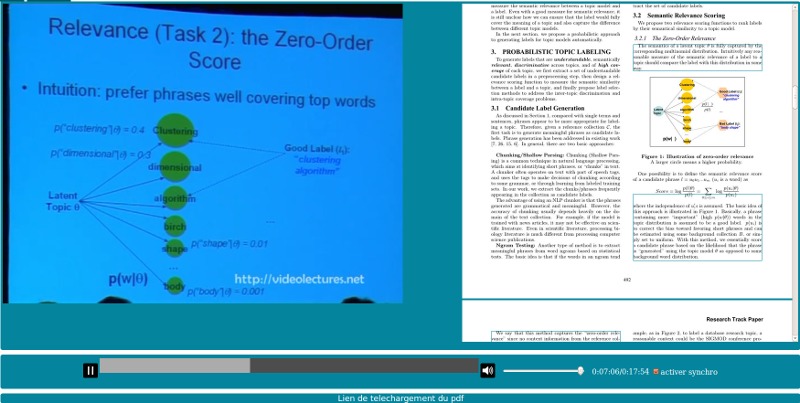Several courses and seminars were recorded and are available in the following section All enriched videos. They are enriched with the corresponding slides (that are navigation shortcuts as well) and with the topics that were covered. You can also take your own notes, synchronized with the recording, to ease future navigation. Click on the image to see an example.
During the summer school CNRS MOOC et EIAH we had the opportunity to organize a workshop regarding video annotations as a way to prepare the scenarization of a MOOC. About 50 people exchanged knowledge and opinions trough live annotation (using our tool COCoNotes Live) of Marcel Lebrun's conference. The notes synchronized with the recording are available by clicking on the image.
A MOOC (Massive Open Online Course) concerning digital addiction (@ddict?), organized by the University of Nantes and the CHU of Nantes, is currently ongoing. During the weekly webinars, the tool COCoNotes Live has been used to allow participants to comment, ask questions, etc. After the webinar, participants can annotate the video and use direct pointers to video fragments in EdX forums.
The literature review on the flipped classroom emphasizes the need for the student to be active (before and during class). Video annotations in this specific context can represent a key tool to boost interactions and participation. This is what we have been testing in collaboration with Polytech'Nantes. The results will soon be posted here.
Open content, freely reusable and remixable, as in the 5 Rs of OERs (Open Educational Resources): Retain, Reuse, Revise, Remix, Redistribute.
Focus on video-based content enriched and augmented by annotations. Rich media and hypervideo rendering. Features for collaborating on videos.
Active reading and appropriation aimed at learners, teachers, general public. Individual and collaborative engagement. Integration within other tools (anchoring possibilities, standards respect).
Strive for quality at several levels: content, user experience and platform. Continuous improvement with regular testing.
Users and developers have access to the source code. Platform built with open source technologies. Systematic use of standards and standardization effort.
Full sovereignty over the produced data and metadata. Mobile design (responsive design). Offline ability, digital accessibility (low bandwidth users, variety of learning situations).
(1) A video is available and (2) it is possible for the learners to annotate it (active reading). (3) The teacher analyses the annotations and may use them to (4) improve his next lecture. (5) Using the annotations it is also possible to add an abstract, a table of contents, i.e. making the content of the video easier to understand. It can be made by a pedagogical team or directly by the learners themselves.
(1) A rough/catch up seminar (V1) is available. (2) Users (teacher, learners and colleagues, depending on the situation) annotate the video. (3) A pedagogical team as well as the teacher use the annotations to scenarize and improve the seminar. (4) A new version (V2) is produced. This scenario can also be used in lectures.
In this scenario a MOOC enriched by the possibility to annotate the video lectures is provided. This way, learners find a MOOC that is interactive and dynamic concerning the learning process. Our vision is to perceive Moocs as an experiment in pedagogy.
(1) The teacher is involved and makes video course modules or complimentary material. (2) Learners can annotate, discuss the material, prepare questions, etc. (3) The teacher reads the annotations and prepare his class. (4) Learners and teacher discuss the content and answer questions, what we call an active lesson.
The COCo project aimed at being an agile innovation lab around enriched pedagogical content, using and expanding research in various domains:
One work in progress was multimodal alignment. It aims at aligning the content of a article with its presentation. You can check the working demo as well as the evaluation interface.

The members of the project organized a few live webinars around education and technology. .
We participated in the development of the Metadataplayer framework. You can also access the source code of our live annotation tool and of the COCoNotes platform.
Another contribution is a summarized survey the use of video in MOOC platforms.
The COCo project is now over (09/2013 - 12/2016). This website is preserved as an archive.
Feel free to contact communication@comin-ocw.org for any question.